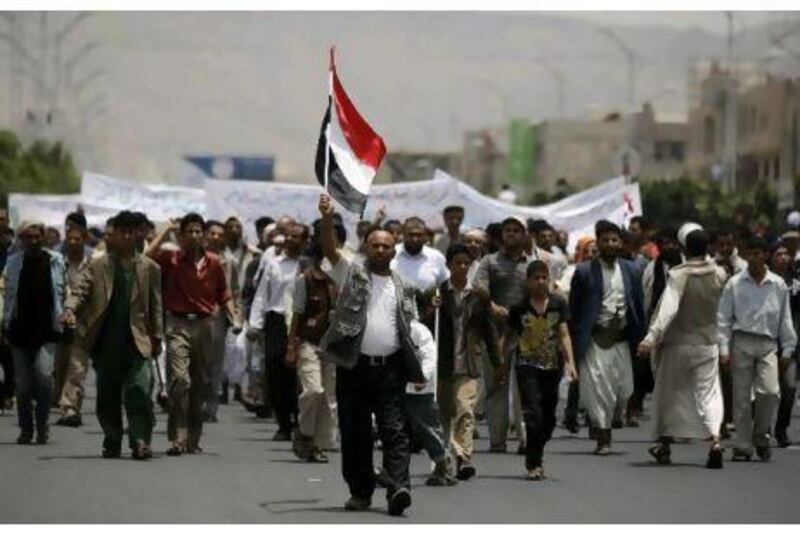SANAA // Yemen's president Ali Abdullah Saleh may be clinging to power but already a conflict of ideas is taking place in Yemen over what form a future state should take.
The battle is pitching prominent Islamists, who want to preserve the prominence of Sharia in the constitution, against protesters calling for an egalitarian "civil state".
"Yemen is going through a critical stage of convulsion between traditional Islamists and civil society groups," said Ali Saif Hasan, director of the Political Development Forum, a Sanaa-based think-tank.
"Some radical Islamist groups are trying to pull us back to the past while civil society and modernity activists are working to push the country towards the future. It is conflict between … supporters of traditionalism and modernism."
Yemen is a presidential republic with a constitution that states Islam is the official religion and Sharia the source of all legislation.
Political groups, clerics and tribal and military leaders have joined the push to end Mr Saleh's 33 years in power but there is a range of opinions over what direction the country should take once he leaves.
The disagreements came to a head at last Friday's demonstrations when a group of young protesters called it a Friday of Civil State and put up banners on a stage in Sanaa's main square calling for a country with equality for all its citizens.
In response, followers of Sheikh Abdulmajeed Al Zindani, a radical Islamist cleric, tore down the banners and demanded that they change the slogan to "an Islamic State" or at least "a state of justice and equality".
Mr Al Zindani's supporters, who operate under different youth groups, then distributed a pamphlet in which they argued that a "civil state" meant abolishing the distinction in Sharia between Muslim and non-Muslim and women and men. The pamphlet also said such a state would adopt democracy, which means the people become the source of rule, which it claimed was against Sharia.
"We were angered by those pamphlets and we went from our tents and started shouting freedom, freedom, we want a civil and egalitarian state," said Ehab Al Samee, a protester. "Dozens of bearded Al Eman university members wielding sticks clashed with us.
"We think we should first revolt against such radical mentalities which want to drag us into the past."
Sheikh Al Zindani, the rector of Al Eman University and an influential leader in the opposition Islamist Islah party, called in a lecture last month for the establishment of an Islamic State in Yemen. He rejected "the legitimacy of the revolution" and said the concept of democracy that it is the rule of the people is infidelity. The "rule should be that of God", he said.
Sheikh Al Zindani, who was accused by the US of radicalising young Yemenis and by the US and UN of financing terrorism, has been an important ally of the president and acted as a mediator between the regime and the opposition until he joined the anti-Saleh protests in March.
But in his lecture he appeared to distance himself from the movement when he said he was against the establishment of a transitional council, a key demand of most opposition groups.
He argued instead that the vice president should take over during the transitional period before a presidential election.
"The Yemeni constitution is one of the best constitutions and those who want to abolish it, they want to abolish Islam in the name of civilisation … the Islamic articles in the constitution are fixed and must not be changed and this is our condition to the election of the coming president," Mr al Zindani said.
In response, dozens of Yemeni intellectuals, civil-society groups, human-rights and democracy activists and writers issued a statement on Friday condemning "Al Zindani and his extremist Jihadist movement" for their stance against changing the constitution which was "against freedom and Islam".
The statement blamed his involvement in the anti-regime movement for scaring people inside and outside the country and for the drop in international support for the revolution.
The statement called on the Islah party and the opposition coalition - the Joint Meeting Parties - to which it belongs to declare its position on Sheikh Al Zindani.
A leading member of the Islah party said that the cleric did not reflect the opinion of the party.
Majed al Madhaji, a democracy activist, said Sheikh al Zindani had been working against any effort to create a modern Yemen.
"This man has been an extremist enemy to this civil revolution," said Mr al Madhaji. "He has joined the protests to book his seat in the new situation. But he started lashing out at calls for a civil state, which represents the dreams of majority of Yemenis."
Sheikh Mohammed al Hazmi, a close follower of Sheikh al Zindani and an influential preacher and MP, said he feared by "civil state" the protesters were demanding a secular state.
"If they mean by a civil state a state of law and institutions, we are all with them. But, if they mean that religion has nothing to do with political and economic life, this is secularism which we do not accept," Sheikh al Hazmi said.





